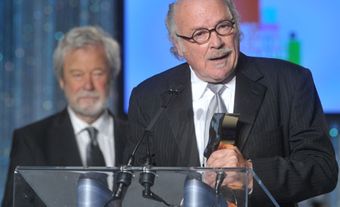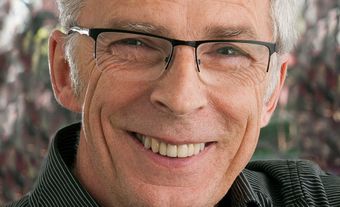This article was originally published in Maclean’s magazine on September 11, 1995. Partner content is not updated.
Ambitious, intricate and ingenious, writer-director Robert Lepage's first feature explores the riddle of identity on a kaleidoscopic variety of levels. "In the city where I was born," intones the narrator, "the past carries the present like a child on its shoulders.Film Review: Le confessional
Ambitious, intricate and ingenious, writer-director Robert Lepage's first feature explores the riddle of identity on a kaleidoscopic variety of levels. "In the city where I was born," intones the narrator, "the past carries the present like a child on its shoulders." The place is Quebec City, which becomes a character in the film. And the narrator is Pierre (Lothaire Bluteau), who has come home for his father's funeral after studying painting for three years in China. He reunites with his adopted brother, Marc (Patrick Goyette), a homosexual tormented by the mystery surrounding his birth. The secret seems to lie with a decadent civil servant named Massicotte (Jean-Louis Millette).
The story shifts between 1989 and 1952, the year Alfred Hitchcock came to Quebec City to film I Confess, the tale of a priest who receives a murderer's confession. In the church where Hitchcock (Ron Burrage) is shooting, a priest hears a confession of a different sort - from 16-year-old Rachel (Suzanne Clément), who works as a maid in the church and is pregnant with Marc. Mixing in clips of I Confess, Lepage sets up a mind-bending hall of mirrors between the two movies. On a visual level, Le confessional is immaculately composed, and full of trompe-l'oeil trickery with the camera. In one anxious scene, Lepage cuts from a shot of Pierre's father shaving with a straight razor to a sink of what appears to be blood - until the camera tilts up to show Pierre cleaning a brush as he repaints his father's apartment.
Bluteau gives a superbly calibrated performance as the delicate Pierre, anguish welling up just beneath his placid exterior. Clément delivers a touching turn as the pregnant Rachel. And Marie Gignac is arresting as Pierre's mother. But Lepage is stronger with images than with character. In a story obsessed with fatherhood, the role of Pierre's father (François Papineau) is strangely underwritten. And, at times, Lepage seems to have a few too many balls in the air - he even throws in clips of China's Tiananmen Square massacre.
Lepage's direction, meanwhile, is almost pathologically controlled. Le confessional is reminiscent of Atom Egoyan's Exotica (1994), not just because both movies include table dancing, but because of the way Lepage peels back onion-skin layers of repressed guilt and anger. The effect is coldly disturbing - and breathtaking.
Maclean's September 11, 1995

 Share on Facebook
Share on Facebook Share on X
Share on X Share by Email
Share by Email Share on Google Classroom
Share on Google Classroom


